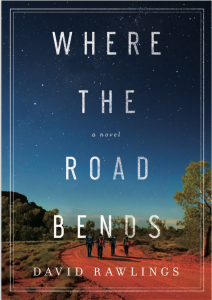by David Rawlings, @DavidJRawlings
I write with themes woven throughout my novels. Weaving a theme through your story can give it the opportunity to breathe and achieve more than just entertain. Themes allow you to pose questions, express your worldview, challenge the reader or root your story in something that connects with the reader’s world.
But you have to do it carefully.
If you launch into your worldview or thump your pulpit, you run the risk of alienating your reader. Thematic writing isn’t as simple as parachuting a worldview into your story, or bringing it out through impassioned speeches that the hero or heroine makes at key turning points in your plot.
The best thematic writing is where you actually don’t see it. It doesn’t get in the way of the story and you may not even ponder it until the story is finished. Take for example, William Golding’s Lord of the Flies. A harrowing story, and one where the theme stays with you after you close the book: human nature at its basest level can be savage. But the story shines through the message.
There have been quite a few books that I’ve read over the years where I’ve put it down when the protagonist (or occasionally the antagonist) ascends a soapbox, and proselytizes two pages of a quasi-religious sermon (in some cases they are religious) about the author’s worldview. That can often be enough to disengage the reader.
Themes aren’t just overarching descriptors: Peace, Love, Achievement, Overcoming. Themes are something that show to the reader how these outcomes came about, or how well they played out in the lives of a character. For example, a theme for your novel isn’t Peace. But it might be Peace comes with a price when you’re trying to change those around you.
My first three novels were modern day parables, taking a thematic approach to a story and building a novel around them. And there are a few things that I learned in that process that I would like to share with you.
- Start with a theme in mind, but frame it as a question rather than a statement.
This is what I do when I’m writing. For my debut novel The Baggage Handler, which won the Christy Award in 2019, I started with this question: What would you do if you discovered you were carrying baggage and had to deal with? I find that starting with a question rather than a blanket statement helps you engage with the reader from the very first word. You’re now responding to a question, you’re not trying to make a point. And if you think about the way we engage in debate with people in the polarized world we live in, asking questions is the way to engage. Making statements complete with your own angry hashtag is a surefire way to put people off.
I find this alone helps keep me away from the preachy side of writing and always brings it back to the reader.

- Select a theme that is universal to your readers, or take a tangent on one that is universal.
Let’s face it, as much as readers want something new and different, many times they’ll shy away from something that is. There’s a reason why libraries have a “Authors that are like ….” section.
The same goes with themes. Select one that feels real to the reader, something that they’re sure to connect with.
In Where the Road Bends, my third novel, the central theme was destiny, and how we find ourselves on the road of life. That’s universal to almost everyone. For my generation, it’s the question we ask in mid-life. Millenials are now experiencing what has been described as quarter-life crises. But they ask the same question.
And I’ve had feedback from people who’ve read Where the Road Bends, and they almost all say that it engaged with them at a basic level because they were in the same place as my characters were. The theme was familiar, and I added the tangent of having them experience it personally while in the outback of Australia. Which leads me to point three …
- Have the theme be a part of the plot, not just the dialogue.
Because I write about themes, I’ve worked hard to try to eliminate the preachy element, and I’ve found that one good way of doing it is to make the choices of your characters where you’ll find the theme, not the dialogue.
I’ve found one of the quickest ways to end up preachy is to give your characters a soapbox on which to stand, and a sermon to deliver. I’ve read a number of books where it’s clear what the author’s position is on any social justice issue, or the environment, or relationships, or faith (or lack of it). You’ll get to page 150 and the character is suddenly giving an impassioned monologue which feels like you’re being lectured to. It’s the lawyer making his or her summing up which seems to grate with his or her journey to that point in the case. It’s the teenager standing up to the Principal and giving a lesson on gender identity, the environment, economic disadvantage, or any of the isms that we currently have populating our media world today.
That’s what I did in my second novel. The Camera Never Lies is built around the theme of honesty and transparency in relationships, and particularly marriage. And the theme now forms the challenge that Daniel, the protagonist, needs to overcome. He constantly runs into his own hypocrisy of keeping his own secrets while as a marriage counselor encouraging people around them people around him to expose theirs. Daniel doesn’t have three or four page slabs worth of dialogue where he talks about the importance of honesty. Instead, he faces patients who mirror his own marriage; a daughter who won’t open up to him and tell him what’s wrong. So I tried to show it through the way that he ran from it and eventually embraced it, instead of preaching to the reader that honesty is everything.
(Here’s the tip to determine if you’re preaching at people about your particular topic: if I can turn the page past this block of dialogue, and not miss anything, then you’re preaching.)
So there’s just a few pointers based on a few ideas based on my approaches to writing. Thematically, if you want to make people think, make people aware or educate them, it’s worth taking some time to get it right. Like any conversation about deeply-held views, you need to make sure that the message comes across in the right way.
Four friends reconnect fifteen years after graduation on a promised trip to the Australian outback. Time has changed them. At graduation life was all about unfulfilled potential. Fifteen years down the track, it feels a lot like regret.
As they get lost in outback Australia they find more than harsh beauty of an unspoilt land… … they discover how the road of life delivered them to where they are now.
And getting back requires them to determine where they’ll go from here.

Based in South Australia, David Rawlings is an award-winning author, and a sports-mad father-of-three with his own copywriting business who reads everything within an arm’s reach. He writes that take you deeper into life, posing questions of readers to explore their own faith and how they approach life.
Where the Road Bends – a novel based in outback Australia – is out now! Why not take a virtual vacation during your time at home?
David’s debut novel – The Baggage Handler – won the 2019 Christy Award for First Novel. His second novel – The Camera Never Lies – focuses on honesty in relationships and is now available.
He is currently signed with Thomas Nelson and represented by The Steve Laube Agency.

